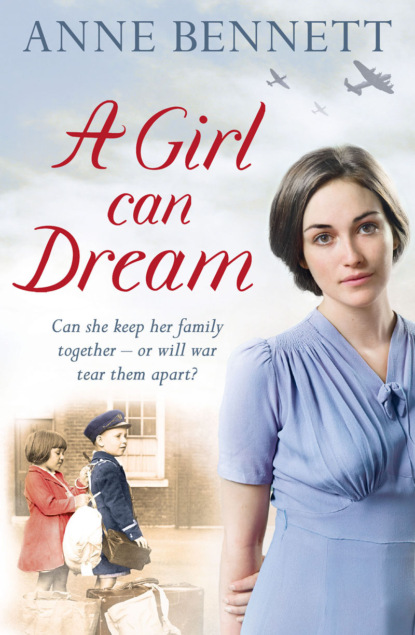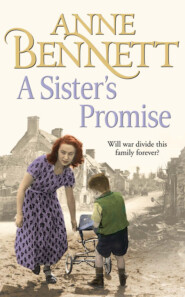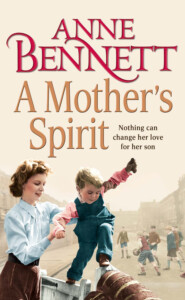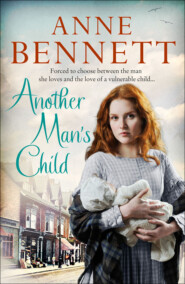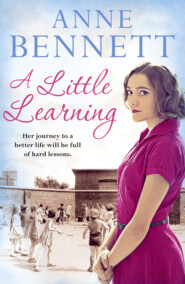По всем вопросам обращайтесь на: info@litportal.ru
(©) 2003-2024.
✖
A Girl Can Dream
Настройки чтения
Размер шрифта
Высота строк
Поля
She was glad that Billy wasn’t old enough for school yet because he was quite good at amusing Ruth and he seemed able to do it for hours which was how long the washing seemed to take and most of it was all down to her, though Jenny came to help before she had to make breakfast for the others and get them off to school.
She knew May would help her if she needed her, but she was getting on now and Meg hated to put on her, but when she said this the following Monday, when they met in the brew house, May dismissed her age.
‘I’m as fit as a fiddle,’ she said. ‘And well used to it – I’ve been at it years. You’ll have the hang of it eventually, but for now if you want a hand you shout. All right?’
‘All right, and thanks, May,’ Meg said. ‘There is so much washing with four children and the baby, who has a wash load of her own, plus my clothes and Daddy’s.’
‘Aye, there will be a fair bit of it,’ May agreed. ‘And the nappies alone will fill one line.’
‘I know, and the ironing takes care of Tuesday.’
May chuckled. ‘A woman’s work is never done.’
‘I’m beginning to see that,’ Meg said.
She wasn’t the only one working hard, for Terry was finding the paper delivering job heavy going. He had a notebook with the roads and numbers and what each house had delivered each day marked down. The houses he delivered to were not squashed together like back-to-backs, but spaced out and hidden behind walls and privet hedges, with sweeping drives, so that it was hard to see the numbers until you were up close.
The first week he was very tired, especially when school reopened, but he never said a word about it. His paper-round money, however welcome, was a fraction of what was needed to run the house though, so he still went to meet his father from the tram on Thursday evening. His uncles were there again so Charlie didn’t protest or bluster, and later Terry was able to deliver three pounds ten shillings into Meg’s hand. She was delighted with such an amount and she put it in a tin box that she’d hidden in the false bottom of the baby’s pram.
The next day she set out for the Bull Ring again, with Billy holding the handle of the pram till his legs got tired, and though she hoped to see Joy, there was no sign of the girl that day. Still, Meg was well satisfied because she’d managed to end up with a pram packed with vegetables and fruit for the family, and she had plenty of money left for the groceries.
As she lifted the baby out of her pram when they’d reached home, Ruth gave her a huge smile that seemed to split her face in two and set her eyes dancing.
The doctor at the hospital had warned Meg that Ruth might be later meeting her milestones as she had been a month premature, but here she was smiling away when she was just over seven weeks old. The smile that she bestowed on Meg made up for the exhaustion of the first few weeks, the night feeds and the fractiousness; it caused a lurch of pure love in Meg’s stomach that took her by surprise because it was so powerful. She gave a cry of delight and hugged her tight.
Now that Ruth had got the hang of smiling, she seemed to do a lot of it; Billy was trying with her all afternoon and Meg told the other children about the smile when they came home from school and they were as delighted as Meg had been when she smiled at them too, but her father only grunted when he was told. Meg refused to let her father’s reaction pull her down or prevent her feeling more positive about the future; she told him that as Ruth only woke once in the night now and was much easier to settle, she would move back into the attic. She knew her decision would be a popular one with everyone – her father would like his own bedroom back and the children would be glad because he would often wake them up when he came stumbling in at night, and Terry said he took up the lion’s share of the bed and snored loudly once he had fallen asleep.
So, life began to fall into a pattern. Meg still found washday hard, but the worst washdays were when it was wet and the washing couldn’t be hung on one of the lines festooning the yard, raised up on gigantic poles to flap in the sooty air. On wet days the washing would be draped around the house, the nappies airing over the fireguard so that everything smelled and felt damp. Sometimes it wasn’t always dry by Tuesday, so the ironing would hang over to Wednesday.
Often May came in to help Meg a bit while she dealt with the baby’s needs. Her aunt Rosie called around regularly too, usually armed with a casserole or a pan of stew, and Meg was glad of this because she was able to save a little money, now that the arrears were paid off fully.
She knew the money would be needed soon to buy coal for the fires and for boots for them all. Maeve had had a new pair of lovely warm lined boots that Meg remembered her father buying the Christmas before, just as she had begun to suspect that she was pregnant, and she had kept them for best so they were like new. Meg’s boots, on the other hand, were worn and shabby and had begun to pinch her feet; yet she hesitated to use any of her mother’s things and all her clothes still hung in her wardrobe or were packed into the drawers.
‘Is it awful to think of wearing things that once belonged to my mother?’ she asked May one day when she popped in for a cup of tea.
May settled herself on the settee and put the tea down on a small table in front of her before saying, ‘How could it? I would call that sensible. What else would you do with them? Give them to the rag-and-bone man?’
‘Well, no, I suppose not,’ Meg said. ‘But I feel awkward about it.’
‘Don’t see why you should,’ May said. ‘You could do with the things, couldn’t you?’
‘Yes.’ Meg couldn’t deny it. In the past year or so her dresses had become extremely short and difficult to fasten over her growing breasts. ‘Mom thought so too,’ she said. ‘She said she would buy me new clothes and shoes for starting work.’
‘There you are then,’ May said. ‘She wasn’t able to do that, so you adapt her things to fit you now. You’re good with the needle. And there’s something else to think of.’
‘What?’
‘Your father,’ May said. ‘I imagine he finds it hard to see his wife’s clothes and shoes still there in the bedroom as if she had never died at all.’
Meg had not really thought about that, but she saw now that May was absolutely right. ‘He’s never mentioned her clothes or anything to me,’ she said to May.
‘Probably hurts him to speak of it,’ May said.
‘I suppose,’ Meg said, and gave a sudden sigh. ‘I don’t half miss her, May.’
May leaned forward and squeezed Meg’s shoulder. ‘I know, and, God knows, I miss her too,’ she said. ‘But what can’t be cured must be endured, as my poor mother would say.’
She took another sip of her tea as Meg said, ‘It might upset me, but Mom’s things have got to be taken out of that room, haven’t they?’
‘They have,’ May said firmly. ‘You shouldn’t do it all on your own, though. I’ll give you a hand if you like.’
‘Would you?’
‘I would and gladly,’ May said. ‘And I say no time like the present.’
‘Now?’
‘Why not?’ May said. ‘Little Ruthie is asleep, Billy’s out playing and I have nothing pressing, so come on, let’s strike while the iron is hot.’
Afterwards, Meg was so glad that May was there with her ready banter to keep misery away, for every garment she lifted from the wardrobe, or drew from the chest of drawers evoked poignant memories of her mother.
But at last all was done and packed away in two tea chests, which Meg got from the attic; a cardboard box that May produced took all the combs, brushes and creams and so forth that littered her dressing table.
Meg was apprehensive about their father’s reaction, but she needn’t have worried. When she asked him to go upstairs to see what she had done, he went straight away and stood for a moment in the doorway.
‘You … you’ve cleared out Maeve’s things,’ he said to Meg.
‘Yes,’ Meg said. ‘Only as far as the attic, though, in case you want to keep anything.’
‘I don’t need a keepsake to remember Maeve. She will be in my heart for ever,’ Charlie said. ‘I’m glad, relieved that you cleared her things away. I couldn’t bring myself to do it and I thought it would be too upsetting for you.’
‘It was a bit,’ Meg admitted. ‘But May helped me.’
‘She’s a good neighbour, that May,’ Charlie said.
‘None better,’ Meg agreed, and then took a deep breath. She didn’t know how her father would take to the idea of her wearing her dead mother’s clothes. ‘The point is, Daddy, what do you want me to do with Mom’s things now?’
‘What d’you mean?’
‘Well, Mom was going to buy me some new things for starting work,’ Meg said. ‘The ones I have now don’t fit too well.’
Charlie looked at his daughter and saw that she was right. Her skirts were far too short and her buttons were strained across her bodice. He was ashamed that he hadn’t seen these things for himself.
‘My boots pinch my feet too,’ Meg said. ‘But if you wouldn’t mind me adapting Mom’s clothes to fit me, Jenny could have my things and Sally have Jenny’s and it will only be the boys who will have to have new things for the winter – and Ruth, of course.’
Charlie drew in a deep breath. ‘I don’t say that it won’t cut me to the quick to see you in Maeve’s things, but if she were beside me this moment she would berate me for being stupid. She has no need of clothes and you have, you all have, so take what you need and I will learn to deal with it.’
Charlie’s eyes were like pools of pain and Meg cried, ‘Oh, Dad, are you sure?’





